I attended the Western Regional Career in Student Affairs Day at UCLA this last Saturday, Oct 17, with the UCSB’s NASPA Undergraduate Fellowship Program (NUFP) team. This was an opportunity for our undergraduate students to learn more about student affairs as a profession and to meet other students and professionals in the field. I also attended to be a panelist for a session on Social Media in Student Affairs. As it was with the previous years I have attended, I left the conference with a sense of renewal and commitment to my role as a student affairs professional. The event was well planned, the sessions were informative, and the speakers were knowledgeable. I sensed those involved in the planning and those who participated in a deep commitment to serving students and learning about student affairs. Beyond the learning were also the fun moments getting re-acquainted with friends and colleagues I interact with through social media and meeting new friends. Here are some of the personal highlights (I can remember) of the conference:
Dr. Sumun (Sumi) Pendakur‘s keynote speech (“The Personal, The Political, and The Professional”). Dr. Pendakur delivered a dynamic speech about the intersections of her personal upbringing and her profession. As she said, “we all come from somewhere, ” she spent some time introducing her parents, specifically her dad, and how their experiences informed and shaped her world views and activism. She shared her personal story because, as she said, “personal narrative informs our work we do.” She spoke about our obligations as student affairs professionals to serve all students and to promote success for all students, not just for some. She asked, “are they graduating and thriving, or are they surviving”? Dr. Pendakur also shared some strategies to get the most out of this conference, which applies to our daily work. For one, she suggests doing some relationship-building – purposeful networking. In addition, she suggested self-care/renewal. Conferences this size can be a challenge for introverts (like me), and it’s okay to find a corner someplace alone to re-energize ourselves on our own. Lastly, she suggested pushing the edge/practicing taking risks. Ask questions and challenge. We need to practice asking questions, and we don’t have to be SSAOs to be asking questions. We can ask questions wherever we sit in the institution.
Reflections from Senior Affairs Officers. Four seasoned administrators (Dr. Jeff Klaus from CSU Long Beach, Dr. Sumun Pendakur from Harvey Mudd College, Dr. Suzanne Seplow from UCLA, and VP Henry Gee, Rio Hondo Community College) along with the facilitator Dr. Mink-Salas from Azusa Pacific University shared some really valuable insights on their experiences, and they also shared important lessons.
Watching two Asian American senior administrators on the panel was a welcome sight. As I wrote in this blog post, we need more Asian American mentors/advocates in higher education. The messages from all of the panelists were valuable, but the messages from VP Henry Gee and Dr. Pendakur spoke to me as an Asian American.
This session made me think about where I am in my career and where I would like to go in my career. During this session, I had this “Eureka” moment of what my purpose in student affairs has been though I never realized what it was. This was to shape my institution and higher ed in general to best, serve the interest of students!
The other important insight I got from this session was the idea that I don’t want to be pigeonholed as an “IT guy” because I’ve primarily been in student affairs IT for most of my career. I have always seen myself as a student affairs professional who works primarily with technologies to promote student success. I have played several roles as an organizational advisor, mentor, FYE discussion leader, multicultural programming facilitator, etc. The challenge and interest for me have been on how to bridge the gap between IT and student affairs and, in general, how to use technology more effectively within student affairs. It is still my goal to be a senior administrator someday to be able to solve the challenge I posed through the position of Dean of Student Affairs Technology, a role that does not yet exist. This role needs to be at the highest level in student affairs organizations sitting alongside other senior student affairs officers (SSAO). As this role still does not exist, I continue to advocate that an IT director or one in charge of enterprise technology initiatives within student affairs needs to be at the SSAO table.
Black Lives Matter in the Ivory Tower: Trials and Triumph in Navigating Anti-Racist Work session. This session was planned to be facilitated by a UCLA senior student affairs official and a panel. Still, due to the ongoing investigation of the “Kanye Western” theme party, which involved racial overtones, Dr. Dougherty, the facilitator, could not attend. The other panelists from other universities were able to attend as well. Two professionals, Diana Victa from Cal State Los Angeles and Patricia Nguyen from UCLA (and UCSB alum), effectively facilitated the hard topics of how to promote anti-racism efforts on campus and the barriers facing these efforts. Participants shared their thoughts about anti-racism challenges and opportunities at their own campuses. Undergraduate students spoke about the challenges of being expected and devoting time towards fighting for social justice while already facing heavy academic work. Some professionals spoke about their personal challenges and how they found their voices in the process. When asked why we attended the session, I shared that I wanted to learn about the topics and, more importantly, to listen to the raw and unfiltered voices of those impacted by racism. I shared that we don’t have enough space to have honest conversations about racism on our campuses. It was a powerful session, indeed. One of the comments shared by a new pro and a former student activist was the myth of resource constraint in response to the idea that we need to be patient in our anti-racism fight. We can’t solve the problem in one day. As the attendee stated, “how is that money magically appearing after a crisis and when the university’s ranking is going down, and donors stop donating as the result of a crisis when students have been talking with the administration for a long time before the crisis.”
Social Media in Student Affairs session. I sat on a panel with VP Henry Gee and Jennifer Rodil, with Grace Bagunu as the moderator. We spoke about the role of social media at the personal, campus, and professional organization levels. As VP Gee shared, Grace was the first social media account manager for NASPA Region 6, and she was instrumental in getting VP Gee to use social media. Jennifer also credited Grace as her social media mentor. I first met my co-presenters through social media and have become friends since we met, so this session was fun to participate in.
VP Gee spoke about why he joined Twitter at the urging of Grace and why he joined Facebook (to listen to feedback about his programs). He also provided important responses to questions from the audience on how to appropriately use social media regarding job searching and networking. Jennifer provided insight on how she manages her department’s social media presence and strategies for promoting engagement with the NASPA Region 6 Twitter and Instagram accounts. An audience member asked how to manage time spent posting content and social media accounts effectively. Jennifer suggested having a schedule of postings along with the schedule are the types of content to post. I spoke about specific uses of social media at UCSB. I cited how I used Facebook to share information about the status of our IT services during the power outage since our email server was out of service. Since we couldn’t send messages through our email server, Facebook became the primary medium to communicate with our UCSB customers about our services’ statuses until we could have email service up and running again. The second example I provided was the significance of social media during a crisis. I specifically spoke about the tragic Isla Vista shooting on Mary 23rd, 2014. Social media became the medium for real-time communication (I learned about the shooting the minute shots were fired from students I advised through their Facebook statuses), community building (show of support within the local UCSB community and across the globe on social media), and event coordination (series of events were held that following week along with a memorial at UCSB’s Harder Stadium attended by 20,000+).
I also spoke about the reasons why I blog, including why I started (I was frustrated because I had a lot of ideas but I didn’t feel heard at my campus, so my blog became a platform for me to express my ideas), what my purpose for blogging (promote student affairs technology and leadership), some strategies and tools I use, as well as how I address the common challenge of how to write authentically (I don’t share everything but what I do share are true to my heart).
Some audience members shared their success stories, including how they used social media on campus. One of the stories shared by the creator of the account was the use of Twitter to inform students of food on the UCLA campus. The Twitter account is called @hungry_bruin.
Several attendees spoke to the panel after the session for several minutes, thanking us and exchanging other ideas.
Ethical and Legal Issues in Higher Education session. I was late to this session because of the last session. Still, I am glad I attended as I learned some valuable insights from the panel, which made me think about the value of understanding policies, making ethical decisions, and the increasingly difficult choices to be made as one advance in the management hierarchy. Institutional responsibility and ethics were discussed as they relate to things we probably don’t consider ethical issues. As one of the panelists shared, staff don’t own the money used to run the university. Students are paying for the services, and so when staff comes into work late, they’re taking resources away from the students. A panelist shared his guiding principle when making tough decisions – “Did I follow the policy, and did I practice fundamental fairness in the process?”
A discussed topic was the issue of individual rights and freedom of expression. As one of the panelists shared, one has the freedom of expression, but one doesn’t have the freedom of consequences. Senior administrators must help frame the consequences of students’ actions in this term “I’m not saying you’re right or wrong, but how is that being perceived? Is that the message you want to send out?”
The three sessions I attended were informative and led me to reflect on my role as a student affairs professional and how I view my role at my university and my career path. In addition to the value provided by the sessions, the most valuable experiences I got out of the conferences came during the breaks and lunch. These were the times when I had the chance to connect with our NUFP fellows and mentors, reconnect with friends I had not seen in a while, and meet new ones. Attending this conference with my fellow and our NUFP team was a wonderful experience we could build upon to further develop our relationships and learn more about each other.
The conference was also an opportunity to connect with other Filipin@-Americans in student affairs. We started this tradition of taking a group photo at conferences starting last year, and this photo below is a part of that tradition. Finally, meeting other Fil-Am professionals, I met via social media face to face for the first time was nice.
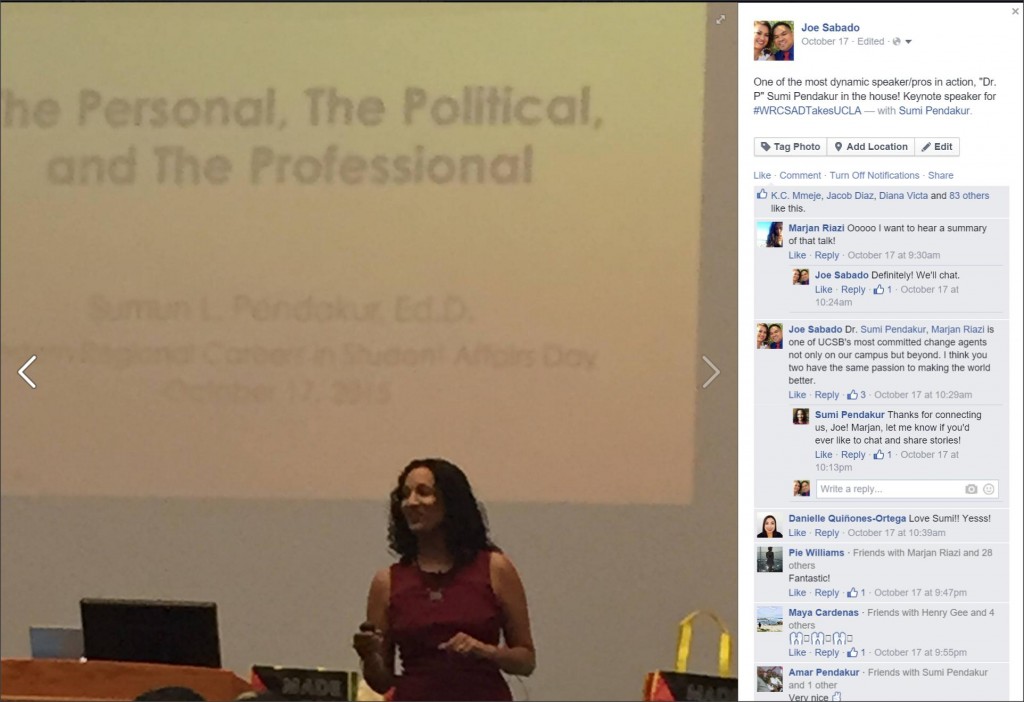
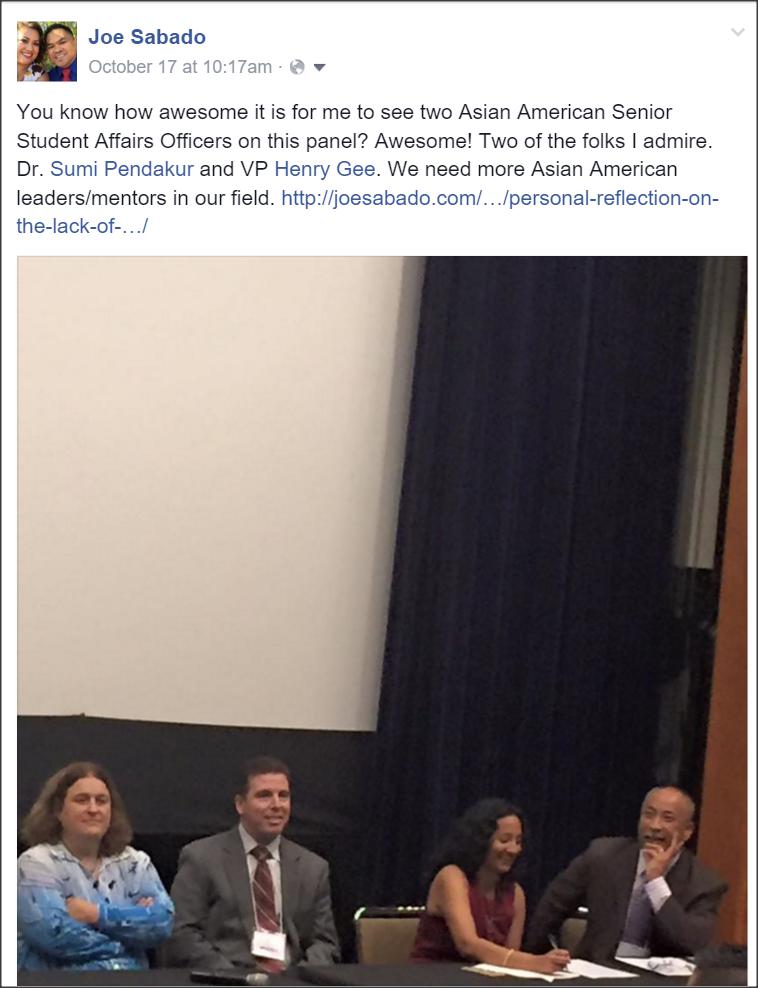
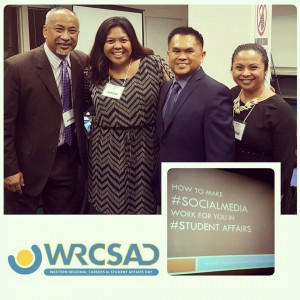
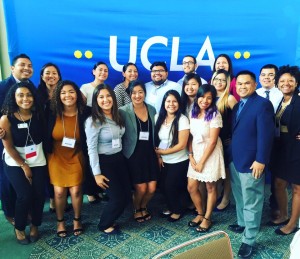
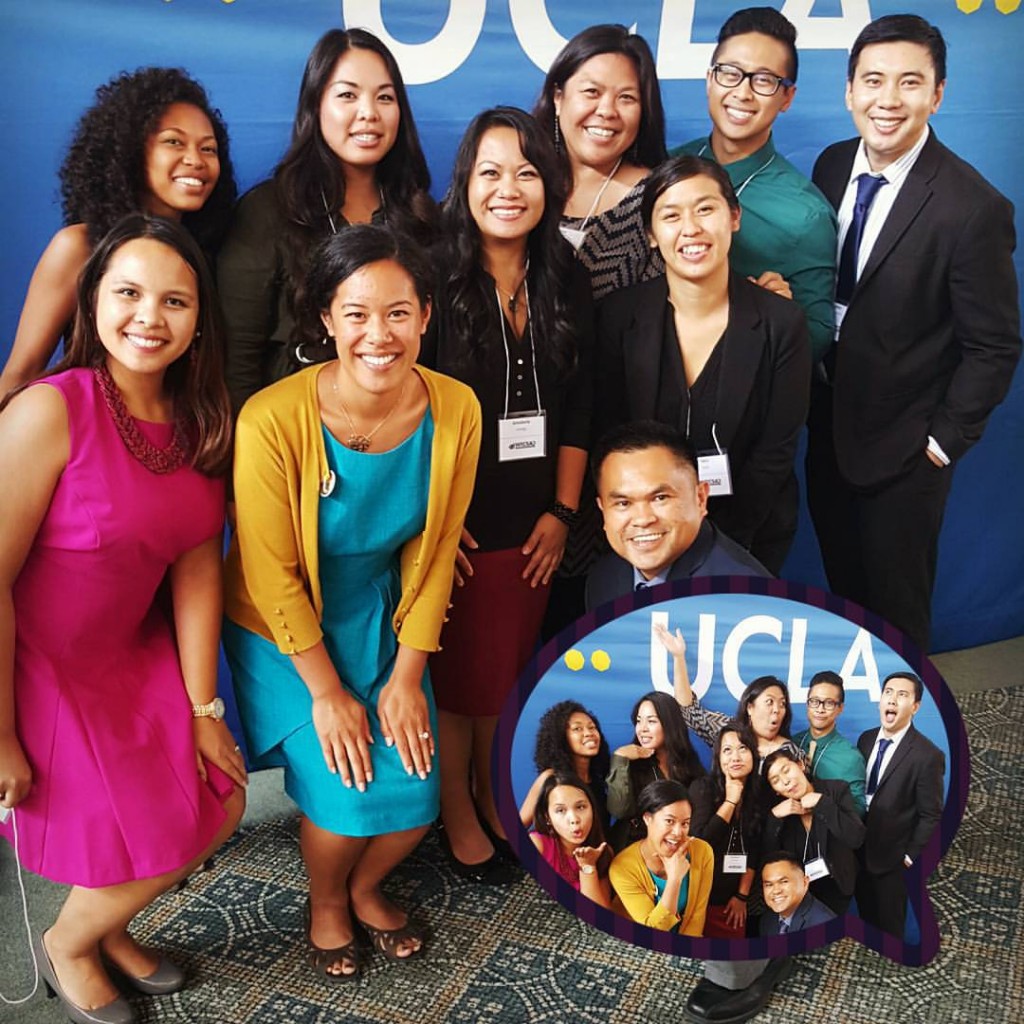
1 Trackback or Pingback for this entry
October 23rd, 2015 on 12:40 am
[…] called some names I may not appreciate, but I will take them on as a challenge. When I attended a student affairs conference this last weekend at UCLA, I attended a panel session of senior higher education administrators […]